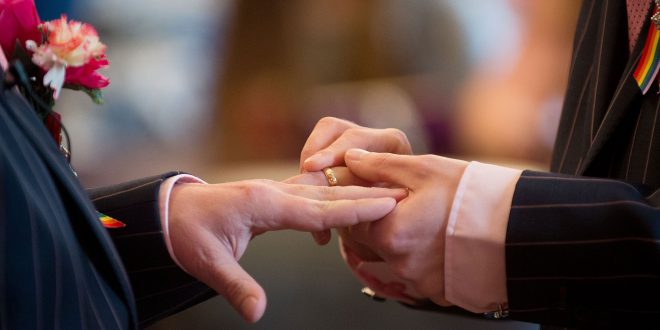A socially or legally recognized union of two people of the same social gender or biological sex is called a gay marriage. Countries have legally formalized marriages of same-sex couples. Recognizing such marriages has become a political, moral, civil rights, religious, and social issue in many countries. Many conflicts have arisen over allowing these couples to marry, whether the term marriage or civil union be used, or be granted limited rights or equal rights.
An argument supporting marriages of the same sex says that denying legal access to benefits and marriage discriminates based on their sexual orientation. Another supporting argument is that physical, psychological, and financial well being are all enhanced by being married. Also the children of these couples will benefit if raised by both parents in a recognized legal union that is supported by society. Court documents state if gay women and men are singled out as being ineligible to marry it stigmatizes them and invites discrimination of the public against them. Other arguments state that there are social consequences of gay marriages, parenting concerns, tradition, and religious grounds.
Gay marriages are legal in Belgium, Argentina, Iceland, Canada, Norway, Netherlands, South Africa, Spain, Portugal, and Sweden. Mexico City, USA and more.. performs gay marriages but has to have recognition of all the Mexican states. Attitudes towards gay marriages range from praise, to indifference, toleration, and prohibition. Some opposers argue that religious freedoms will be eroded, and while good for a couple, the rights of children are undermined. Some supporters think the government should not regulate personal relationships.
 Lesbian, Gay, Bisexual, Transgender & Intersex News Lesbian News, Gay News, Bisexual News, Transgender News, Intersex News, LGBTI News
Lesbian, Gay, Bisexual, Transgender & Intersex News Lesbian News, Gay News, Bisexual News, Transgender News, Intersex News, LGBTI News




